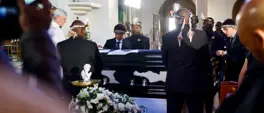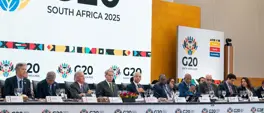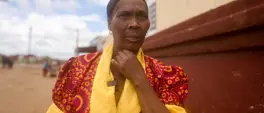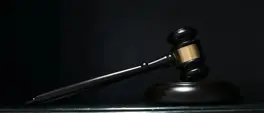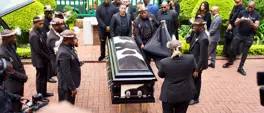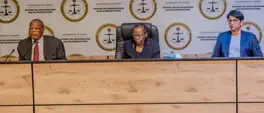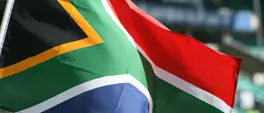MALAIKA MAHLATSI: The dangerous myth of 'reverse apartheid' in South Africa
Malaika Mahlatsi
17 February 2025 | 10:09To be clear, there is no 'reverse racism' or 'reverse apartheid' in South Africa. What there is, is an attempt by the democratic government to redress injustices of a past that systematically brutalised and disenfranchised the Black majority, writes Malaika Mahlatsi.
If you have lived in South Africa long enough, you have most certainly heard the term "reverse apartheid" used by a section of the White population in the country. "Reverse apartheid" is similar to reverse racism, sometimes referred to as reverse discrimination. This is the concept that affirmative action and similar race-conscious programmes for redressing racial inequality are forms of anti-White racism.
The term has often been used by disgruntled right-wingers to characterise the democratic dispensation. It has also gained popularity in the Global North, particularly in Europe and the United States, where there is a growing anti-immigrant sentiment that is premised on the illogical idea that the White race is being displaced by a growing number of people of the global majority (a collective term for people who are not considered White, which encompasses the majority of the world's population including Black, Latino, Asian, Indigenous and persons of mixed heritage) migrating to historically Caucasian geographies.
In a 2023 study titled Young Masculinities and Right-Wing Populism in Australia, researchers led by Professor Pam Nilan of the Alfred Deakin Institute in Victoria found that there is some affinity between disenfranchised White working-class young men and radical right ideas. At the heart of these ideas is the sentiment that working-class White people are particularly disenfranchised in Australia while Indigenous people or First Nations people supposedly have it much easier, constituting "reverse racism". This sentiment is also very popular in Europe, where right-wing extremism is on the rise. A survey conducted by data journalist, Victoria Waldersee, found that in Britain, between one-tenth and one-fifth (10 to 20%) feel that people from ethnic minority backgrounds face lesser discrimination than White people. In other words, White people are more strongly discriminated against in British society.
The perception of "reverse racism" was also witnessed in a British Royal Air Force (RAF) inquiry that was established after the resignation of a RAF Group Captain, a White woman, who was protesting what she deemed a discrimination of White men by the diversity and inclusion policies that the RAF had implemented. She contended that fast-tracking women and ethnic minorities was contrary to the Equality Act and discriminated against White men. While the RAF defended its recruitment practices, arguing that its policies amounted to positive action, not discrimination, the government ultimately sided with the group captain.
In the United States, under the presidency of Donald Trump, the "reverse racism" argument is especially pronounced. He planted the seeds for it during his campaign, stating in a TIME interview that there is "a definite anti-White feeling" in the USA. He was echoing the sentiments of many of his Republican supporters who were arguing that under the Democratic administration, African-Americans and other minorities were supposedly prioritised, resulting in a situation where "anti-White racism" was representing a greater problem than anti-Black racism. Without any facts backing this argument, it became an accepted truth in Trump’s campaign and remains so to date. Thus, it should come as no surprise that Trump has fashioned himself as a saviour of all White people in the world who are "oppressed".
A week ago, Trump signed an executive order that stopped all aid and financial assistance to South Africa as punishment for what his administration claims are "rights violations" by the government against some of its White citizens. The administration claimed that the South African government is allowing violent attacks on white Afrikaner farmers and introducing a land expropriation law that enables it to "seize ethnic minority Afrikaners' agricultural property without compensation". This echoes the sentiments shared by his trusted associate and head of the Department of Government Efficiency, Elon Musk, who has perpetuated the false narrative that White people are oppressed in South Africa.
Just days after the signing of the executive order, the US Secretary of State, Marcos Rubio, announced that he would not be attending a G20 Summit scheduled to take place this month in Johannesburg. Repeating the falsehood of land seizures, he stated: "South Africa is doing very bad things. Expropriating private property. Using G20 to promote 'solidarity, equality, & sustainability'. In other words: DEI and climate change" - referring to South Africa's diversity, equity and inclusion initiatives.
This attack on DEI initiatives began in the USA, with claims that they are anti-White. And yet, in the USA, like in Europe and South Africa, it is White people, not Blacks and minorities, who are at the top of the food chain. Every measure of development confirms this. Studies by the European Union Agency for Fundamental Rights, including the most recent Being Black in the EU report, cement this fact.
The myth of "reverse racism" exists only in the minds of racists and right-wing elements like Trump and Musk. As various decoloniality scholars have argued, prejudice and discrimination are inherently tied to historically rooted and entrenched, institutionalised forms of systemic racism and racial hierarchies, injustices and power imbalance. Blacks in South Africa are not racist, because racism is not simply a feeling of resentment of White people, which in a country with a history of centuries of oppression, is a valid emotion. Rather, as argued by Operario and Fiske in a 1988 article in the book Confronting Racism: The Problem and the Response, racism equals power plus prejudice. For "reverse racism" or "reverse apartheid" to be feasible, Black people would have to be the creators and beneficiaries of a system of group privileges enabled by a disproportionate share of society’s power and property.
To use the words of Feagin and Vera in White Racism: The Basics, published in 1995: "Black (or other minority) racism would require not only a widely accepted racist ideology directed at Whites but also the power to systematically exclude Whites from opportunities and rewards in major economic, cultural and political institutions. While there are Black Americans with anti-White prejudices, and there are instances of Black discrimination against Whites, these examples are not central to the core operations of the society and are not an entrenched structure of institutionalised racism".
To be clear, there is no "reverse racism" or "reverse apartheid" in South Africa. What there is, is an attempt by the democratic government to redress injustices of a past that systematically brutalised and disenfranchised the Black majority that continues to be the face of exclusion, poverty, unemployment and inequality. Anyone who says anything different, whether it is Donald Trump or the right-wing element within the country, is afflicted with apartheid nostalgia. Such people are extremely dangerous and pose a real threat to the democratic project.
Malaika Mahlatsi is a geographer and researcher at the Institute for Pan African Thought and Conversation. She is a PhD in Geography candidate at the University of Bayreuth in Germany.
Get the whole picture 💡
Take a look at the topic timeline for all related articles.
